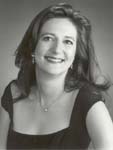| Interpreting | |
| by Suzanne Glass |
 Words have always been my passion. When I was very small my father taught me to say "Supercalafragilisticexpialidocious." I was so excited when I could master the word. I loved the way it felt on my tongue, the way it tickled the roof of my palate. I loved the way people laughed when they heard me say it. My parents say I spoke my first words at seven months, and that they always knew my future lay with language. At school, I would walk out of exams with 13 percent on a science test, and 90 percent on a French test. I was a right-brain girl from the word go.
Words have always been my passion. When I was very small my father taught me to say "Supercalafragilisticexpialidocious." I was so excited when I could master the word. I loved the way it felt on my tongue, the way it tickled the roof of my palate. I loved the way people laughed when they heard me say it. My parents say I spoke my first words at seven months, and that they always knew my future lay with language. At school, I would walk out of exams with 13 percent on a science test, and 90 percent on a French test. I was a right-brain girl from the word go.
 Foreign languages are in my blood. My grandparents were German-Jewish refugees, and my father conducted much of his business with France, and so the sounds of foreign tongues were always wafting around.
Foreign languages are in my blood. My grandparents were German-Jewish refugees, and my father conducted much of his business with France, and so the sounds of foreign tongues were always wafting around.
I have always been horribly nosy, so the combination of that and a love of languages made interpreting a natural choice of profession. It meant I could eavesdrop on others people's conversations and get paid for it at the same time. Once I had become an interpreter, though, it seemed just like any other job, but I noticed how people would react to us hidden away in our little booths with our headphones on at the back of conference halls. They would simply turn round and stare at us while we translated, as though we were some sort of strange extra-terrestrial creatures.
 Reading about people's passion for their professions has always fascinated me. I loved The Pianist by Wladys Szpilman, a book that tells the story of a man's love of music against the backdrop of the horrors of the holocaust. I was morbidly fascinated by Patrick Mc Grath's Asylum . . . a novel about a brilliant but pathological sculptor. Once I had left interpreting behind it occurred to me that other people might be intrigued by a love story that took place within the professional world of the interpreter.
Reading about people's passion for their professions has always fascinated me. I loved The Pianist by Wladys Szpilman, a book that tells the story of a man's love of music against the backdrop of the horrors of the holocaust. I was morbidly fascinated by Patrick Mc Grath's Asylum . . . a novel about a brilliant but pathological sculptor. Once I had left interpreting behind it occurred to me that other people might be intrigued by a love story that took place within the professional world of the interpreter.
The idea for the story really began on a walk in the park with my father one crisp Sunday morning. "I've got the seed of an idea for a novel," I said. "So, tell me about it," he replied. By the time we had walked round the park three times on that January day, The Interpreter had been written in my head.
 The first line of the book -- spoken in the voice of Dominique, the simultaneous interpreter -- is "I was in the dark." It held true for her, and it certainly held true for me: I had no idea what it meant to write a novel. When I signed the contract to write The Interpreter, I had no more than an intellectual understanding of the hundreds of hours of pacing and of isolation it would take to come up with a final draft. I describe the process of writing a first novel as "exquisite pain."
The first line of the book -- spoken in the voice of Dominique, the simultaneous interpreter -- is "I was in the dark." It held true for her, and it certainly held true for me: I had no idea what it meant to write a novel. When I signed the contract to write The Interpreter, I had no more than an intellectual understanding of the hundreds of hours of pacing and of isolation it would take to come up with a final draft. I describe the process of writing a first novel as "exquisite pain."
When the going got tough, I would switch off the computer and turn to someone else's words. (Most notably, the lighthearted words of Helen Fielding in Bridget Jones Diary, which made me laugh and laugh and laugh.) And yet, for all that, the process was a cathartic one, during which I, like Dominique, somehow found my own voice.
Suzanne Glass worked for five years as a simultaneous interpreter, and then relaxed by pursuing a graduate degree in journalism. After living in various cities around the world, she now resides in London and writes a regular column called "The Looking Glass" for the Financial Times. Her well-received first novel, The Interpreter, concerns a woman finding her own voice after being the voice of others.
*A January/February 2001 Book Sense 76 Pick
"A moral dilemma awaits Dominique, a simultaneous interpreter, and Nicholas, a young physician turned researcher, in this novel set in contemporary New York. Told in alternating chapters, this beautiful and insightful novel moves towards a very powerful finish."
- Penny McConnel, The Norwich Bookstore, Norwich, VT
Author photo by Stuart Rodgers, Ltd.
